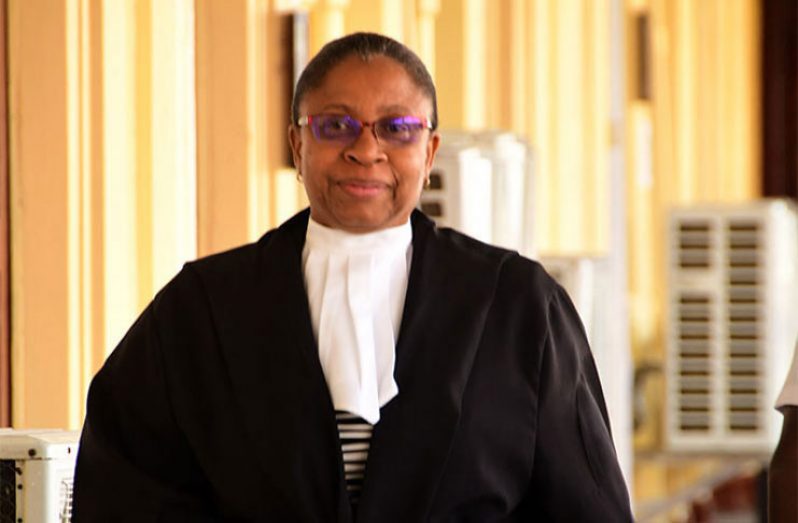– March Declarations cannot be resurrected – High Court Rules
– Jones to file appeal
Chief Justice (ag) Roxane George-Wiltshire on Monday afternoon ruled that the results of the 2020 General and Regional Elections could only be based on the data coming out of the National Recount, noting that at this stage, the 10 Declarations made in March cannot be resurrected.
In handing down her judgement in the Misenga Jones Case, the Chief Justice, while relying on the past decisions of the Court of Appeal and the Caribbean Court of Justice (CCJ), said that the National Recount cannot be considered to be invalidated at this stage of the electoral process.
“In this context, the Section 84 (1) Declarations can no longer be considered useful, hence, while the CEO may be expected to act independently he cannot be a lone ranger,” Justice George-Wiltshire said during her virtual ruling broadcast live on YouTube.
The Chief Justice noted that contrary to submissions by the Misenga Jones, the Chief Elections Officer, Keith Lowenfield and the Attorney General Basil Williams, the Caribbean Court of Justice (CCJ), in the Ali and Jagdeo Case, did not invalidate the Recount Order (Order 60) but rather endorsed it.
“As determined by the CCJ, unless overturned by a court in an elections petition, the only data that could be used for the declaration of the results of the elections would have to be the recount results or data. For the reason outlined, the 10 declarations cannot be resurrected at this point in time,” the Chief Justice ruled.
Further, the Chief Justice ruled that the Chief Elections Officer (CEO) must comply with directives of the Guyana Elections Commission (GECOM), and its Chairman, Justice (Ret’d) Claudette Singh.
“The CEO is functionary of GECOM pursuant to Article 161 (A) and Sections 2 and 7 of the RPA (Representation of the People Act). Section 18, which is repeated in Order No. 60, merely confirms this, and the obvious for the avoidance of doubt, that the CEO cannot act on his own,” she explained, while noting that Section 18 is not in conflict with Article 177 (2) (b) of the Constitution.
The Chief Justice said challenges to validity of the recount data or any such electoral dispute must be brought by way of an Elections Petition after the declaration of the results as indicated by both the Court of Appeal and the CCJ. Until then, she said the recount data must be used in keeping with the directive of the Elections Commission.
“If it is the considered opinion of the CEO that in the face of Order 60, he can produce a report based on the Section 84 Declarations then one would expect that he must be guided accordingly by GECOM,” Justice George-Wiltshire said while noting that there could no longer be an impasse between the CEO and the Chair of GECOM with respect to the implementation of Article 177 (2) (b) of the Constitution.
Senior Counsel Roysdale Forde, one of the attorneys representing Jones, indicated to the Court that his client will be filing an appeal no later than tomorrow and sought a commitment from the Chairman of GECOM to stay the electoral process until a final determination is made by the Appellate Court. Attorney Kim Kyte-Thomas, who appeared for the Chair of GECOM, offered that commitment once the appeal is filed by tomorrow.


.jpg)











